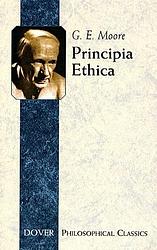Principia Ethica by George Edward Moore
"Principia Ethica" is a philosophical work that argues for the objectivity of good, stating that it is a simple, indefinable and non-natural property that cannot be broken down into any other properties or concepts. The author challenges the prevailing ethical theories of his time, such as utilitarianism and hedonism, and introduces the "naturalistic fallacy," the idea that it is incorrect to define "good" in terms of natural properties. This book is known for its rigorous argumentation and its significant influence on the development of analytic philosophy and ethics.
The 1764th greatest book of all time
Ranking Details:
Our ranking system awards points to books based on their appearance and position on curated lists. Here's how it works:
Unranked Lists: For lists without specific rankings, each book receives points equivalent to the list's weight. This approach recognizes the book's inclusion on prestigious lists.
Ranked Lists: Books on ranked lists receive points in two ways:
- Base Points: Initially, every book is awarded points equal to the list's weight, acknowledging its significance.
- Bonus Points: Additionally, books earn bonus points based on their ranking. The total bonus pool, equal to 100% of the list's weight, is distributed among the books, with higher-ranked books receiving more points.
Exponential Distribution: The distribution of bonus points follows an exponential model. This means the top-ranked book (#1) receives significantly more bonus points than those further down the list (e.g., #100). Our algorithm ensures that higher placements are rewarded more generously, reflecting the achievement of a top rank on any given list.
This scoring system ensures that each book's ranking reflects both its presence on multiple lists and its positions within those lists, providing a comprehensive measure of its acclaim and popularity.
Total Points: 213
Since this book was first published in 1903, there is a penalty of 0%. The age adjusted score is 213.0.
This is to prevent newer books from reaching super high on the ranked list of the greatest books of all time. The greatest books should also stand the test of time.
- score: 111 -- The Modern Library | 100 Best Nonfiction (Weight: 108)
- score: 102 -- The Modern Philosophical Classics (Weight: 96)

